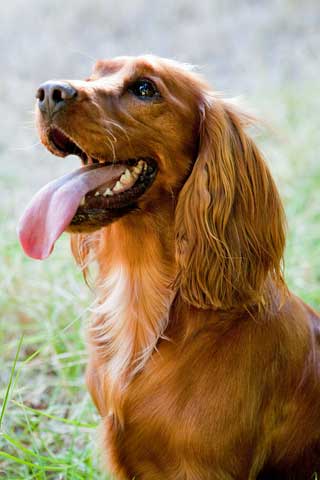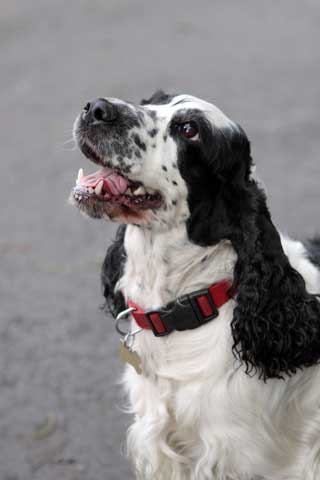- Home
- Grooming a Cocker Spaniel
- Brushing your dog's teeth
Brushing Your Dog's Teeth Will Give Him Clean, Healthy Pearly Whites!
Brushing your dog's teeth will keep them clean and healthy, preventing the build-up of plaque and tartar, which is essential to good oral hygiene.
Keeping your Cocker Spaniel's pearly whites clean can also contribute to your his overall general health! The sooner you begin, the better, so here's our guide to cleaning your dog's teeth.
Is Brushing Your Dog's Teeth Really Necessary?
The short answer to that is yes!
If your dog's teeth aren't brushed regularly, the gradual build-up of plaque and tartar will almost certainly lead to gum disease, which can be painful.
It can also lead to infection, increased bacteria, and subsequent serious health problems for your little guy.
 Brushing your dog's teeth for beautiful pearly whites!
Brushing your dog's teeth for beautiful pearly whites!If you really need some motivation for brushing your dog's teeth, here it is:
- When tartar forms on the gum line, it often leads to inflammation which will eventually cause the gums to separate from the teeth leaving spaces where bacteria can breed.
- Where bacteria is prolific, it can lead to abscesses, rotting and loosening of the teeth, bone deterioration and eventual tooth loss. Not good, huh?
- Even worse, when bacteria from an infected gum or abscess enters the bloodstream, it can cause serious harm to your pet's vital organs (kidneys, liver, heart) and can affect the overall health of your Cocker Spaniel.
- Apart from the obvious signs of gum disease, bad breath is another, so if your dog's breath is terrible, it's possible he has gum disease, infection and/or high bacteria levels in his mouth.
Periodontal disease can't be reversed, but the good news is that by brushing your dogs teeth, you can help to prevent gum disease in the first place!
In addition to brushing, feeding your Cocker Spaniel dry dog food (kibble), biscuits, rawhide bones, and dental sticks, and letting him play with hard chew toys, can all go a long way to keeping his teeth clean and healthy.
If your dog already has a lot of tartar on his teeth, I would advise you to make an appointment with his vet for cleaning and de-scaling because it's not possible to remove tartar simply by brushing alone.
You can then begin a new regime of dog teeth cleaning with complete confidence!
Read on to learn more about brushing your dog's teeth and pick up some valuable tips and techniques!
Doggie Toothpaste & Toothbrush
When brushing your dog's teeth, it's advisable not to use human toothpaste because it foams up too much, and your pet will probably swallow most of it anyway, which could upset his little tummy.
You can buy specially formulated dog toothpaste flavoured with beef, chicken, and many other appealing tastes that doesn't foam and won't harm your Cocker if swallowed.
You can even buy him his own special doggie toothbrush!
Don't be tempted to use a 'human' toothbrush because the bristles will be too hard for his mouth.
Okay, perhaps a baby toothbrush might do (at a push), but the ideal brush for your dog will have an angled head for more accurate brushing and very soft bristles.
If you feel a toothbrush is a step too far for you, you might like to try using a finger toothbrush before gradually working up to a canine toothbrush.
As the name suggests, it is a rubber cap with a knobbly surface, which fits onto the end of your finger, and you rub it across and around his teeth and gums.
How Often Should You Be Brushing Your Dog's Teeth?
Brushing dog teeth kills bacteria, so in an ideal world, you would brush every day for beautifully clean and bacteria-free teeth.
However, if you (and your Cocker) feel this is too much too soon, you could begin with once a week and increase the frequency when you think your dog is becoming more comfortable with having his teeth brushed.
If you have a puppy or adopted an adult Cocker Spaniel, who is not familiar with having his teeth brushed, I would advise you to accustom your pet to having his gums and mouth inspected, and his teeth brushed.
This will pay dividends in the long run!
Brushing Your Dog's Teeth the Easy Way!
Okay, if you're ready to try it, here's how!
First of all, find a quiet place away from distractions.
 Look Mum, clean teeth!
Look Mum, clean teeth!- Place a small amount of toothpaste onto his toothbrush and work it into the bristles; otherwise, it will either fall off into his mouth and he'll swallow it, or he'll try to lick it off the brush.
- Rubbing the paste into the bristles will definitely increase the chances of the toothpaste actually reaching his teeth!
- You can either ask your dog to lie down or sit. It's a matter of personal choice. My preference is for Max to lie down and lay on his side because it relaxes him more.
- Lift up his upper lip and begin brushing gently, either in a circular motion, from side to side or back to front. It doesn't really matter so long as the teeth are brushed.
- Do this for approximately 10-15 seconds, and don't forget to brush his gums too (very gently) to help keep them pink and healthy.
- Next, pull down his lower lips and brush his bottom teeth and gums in the same way. Be very gentle on the gums.
- Don't forget the back teeth, as this is where most of the plaque and tartar will accumulate.
- Gently turn him over and begin brushing the other side in the same way.
- There's no real need to brush your dog's front teeth, but if you want to (and he'll let you!), be very gentle as they're pretty sensitive. Praise him if he doesn't make a fuss!
- Don't worry about the inside surfaces, as his tongue and the actual eating process will help clean them up.
Brushing your dog's teeth should be kept low key. Take it slowly and gently and if your Cocker Spaniel sits quietly while you work, praise him and reward him with a small (dental) treat or a few games afterwards.
Cleaning Your Dog's Teeth: Summary
You may have thought that cleaning and brushing your dog's teeth would be difficult, fiddly, and time-consuming, and you may have asked yourself, 'Why should I bother? He's only a dog, for heaven's sake?'
Well, we know that perseverance and a gentle approach to your dogs dental care can not only improve the state of his teeth and gums but can actually help him to live a longer, happier and healthier life - now, isn't that a big enough incentive for brushing his teeth?
PS: If you have a puppy, you might like to get started now and get your puppy used to the feel of a toothbrush in his mouth so that when it comes to the real thing, there won't be any tears before bedtime!
Photo credits: Brushing Your Dog's Teeth
1. Michelle De Kock at https://www.dreamstime.com/english-cocker-spaniel-image13579192
2. Ks2008q at https://www.dreamstime.com/stock-image-cocker-spaniel-portrait-image14759201


